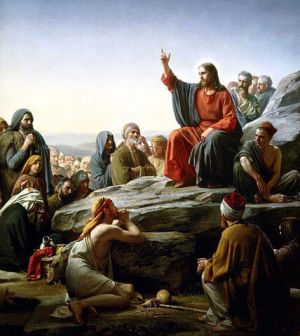Have we got Jesus wrong?
Jesus asked them: "But who do you say that I am?" (Mark 8:29)
Former British Prime Minister Tony Blair tells a story about how he once found himself making small talk at a diplomatic reception with a woman whose face seemed familiar but whose identity he couldn't quite recall.
After a while he plucked up the courage to ask what she did, hoping this would give him a clue as to who she was, at which point she responded with words which may be summarised as: "I am still Beatrix, Queen of the Netherlands."
It is easy to make mistakes about people's identity. In the Christianity Explored course, Anglican minister Rico Tice tells a similar story of failing to recognise a man he found himself next to at a restaurant. Only later did he realise the individual was Prince William.
But what about Jesus? Who do we say that he is? What identity do we give to Jesus? If we're Christians, chances are we may think we have this question sorted. But I wonder if we have really. And if we wouldn't call ourselves Christians – for whatever reason – it is also a question well worth exploring because it affects so many vital matters. Here are some common mistakes we can make when it comes to Jesus' identity:
Jesus the revolutionary: This was what many in the first century were hoping for, of course – a political revolutionary who would lead an uprising against the occupying Romans. And, in various guises, it's a concept which still does the rounds today.

There's an element of truth in this, of course: Jesus is revolutionary. But that revolution comes about firstly through changed human hearts, as a result of which human power structures may indeed be transformed (as with South Africa's Truth and Reconciliation Commission). The revolution starts not on the streets but in the heart.
Jesus the nice: This is a common one, of course. It partly stems from hymns and carols (for example, "Christian children, all must be, mild, obedient, good as he" – which sounds a terribly Victorian prescription for childhood!). It also comes from Jesus' edict to "turn the other cheek".
But this view tends to forget that Jesus warns about God's justice, judgement and hell, and tells some of his religious contemporaries they are like "whitewashed tombs" which look impressive but are full of death and dirt. Jesus isn't "nice".
Jesus the King Arthur-style legend: A poll in November 2015 revealed that 40 per cent of the British public think Jesus is just a myth.
It's an astonishing figure, especially when you consider that whereas today there are only 10 ancient copies of Caesar's Gallic Wars in existence, and the earliest of these dates from 875 years after the original, there are 14,000 comparable ancient copies of Mark's gospel, the earliest dating 240 years or less after the original. There are books such as Richard Bauckham's 'Jesus and the Eyewitnesses: the gospels as eye-witness testimony' (2008) which explores this particular question further.
For all of us, Jesus makes it clear that the question of his identity is absolutely vital (Mark 8v27). And even when Peter gets the "right" terminology for his answer ("You are the Messiah") Jesus has to explain that the sort of Messiah he is will be quite different from what many were expecting. He begins explaining he "must undergo great suffering..., be killed, and after three days rise again" (v31).
It didn't go down well with Peter, who scolds him (v32). It doesn't go down well with many today. Jesus tells Peter he needs to have a complete re-think (v33). And maybe for some reading this today that challenge applies as well.
This simple prayer can help all of us: "Open our eyes, Lord, that we may see Jesus."
The Rough Guide to Discipleship is a fortnightly devotional series. David Baker is a former daily newspaper journalist now working as an Anglican minister in Sussex.











